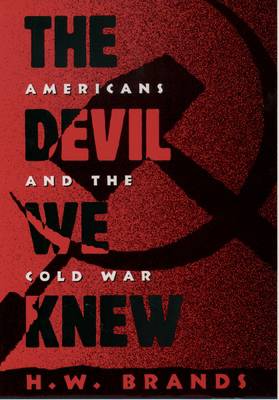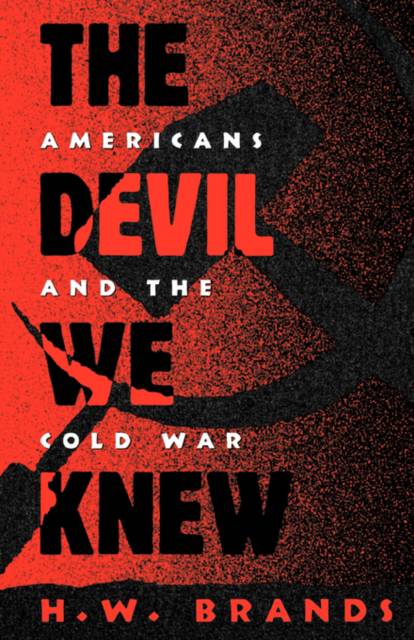
Bedankt voor het vertrouwen het afgelopen jaar! Om jou te bedanken bieden we GRATIS verzending (in België) aan op alles gedurende de hele maand januari.
- Afhalen na 1 uur in een winkel met voorraad
- Gratis thuislevering in België
- Ruim aanbod met 7 miljoen producten
Bedankt voor het vertrouwen het afgelopen jaar! Om jou te bedanken bieden we GRATIS verzending (in België) aan op alles gedurende de hele maand januari.
- Afhalen na 1 uur in een winkel met voorraad
- Gratis thuislevering in België
- Ruim aanbod met 7 miljoen producten
Zoeken
Omschrijving
In the late 1950s, Washington was driven by its fear of communist subversion: it saw the hand of Kremlin behind developments at home and across the globe. The FBI was obsessed with the threat posed by American communist party--yet party membership had sunk so low, writes H.W. Brands, that it could have fit "inside a high-school gymnasium," and it was so heavily infiltrated that J. Edgar Hoover actually contemplated using his informers as a voting bloc to take over the party. Abroad, the preoccupation with communism drove the White House to help overthrow democratically elected governments in Guatemala and Iran, and replace them with dictatorships. But by then the Cold War had long since blinded Americans to the ironies of their battle against communism.
In The Devil We Knew, Brands provides a witty, perceptive history of the American experience of the Cold War, from Truman's creation of the CIA to Ronald Reagan's creation of SDI. Brands has written a number of highly regarded works on America in the twentieth century; here he puts his experience to work in a volume of impeccable scholarship and exceptional verve. He turns a critical eye to the strategic conceptions (and misconceptions) that led a once-isolationist nation to pursue the war against communism to the most remote places on Earth. By the time Eisenhower left office, the United States was fighting communism by backing dictators from Iran to South Vietnam, from Latin America to the Middle East--while engaging in covert operations the world over. Brands offers no apologies for communist behavior, but he deftly illustrates the strained thinking that led Washington to commit gravely disproportionate resources (including tens of thousands of lives in Korea and Vietnam) to questionable causes. He keenly analyzes the changing policies of each administration, from Nixon's juggling (SALT talks with Moscow, new relations with Ccmmunist China, and bombing North Vietnam) to Carter's confusion to Reagan's laserrattling. Equally important is his incisive, often amusing look at how the anti-Soviet struggle was exploited by politicians, industrialists, and government agencies. He weaves in deft sketches of figures like Barry Goldwater and Henry Jackson (who won a Senate seat with the promise, "Many plants will be converting from peace time to all-out defense production"). We see John F. Kennedy deliver an eloquent speech in 1957 defending the rising forces of nationalism in Algeria and Vietnam; we also see him in the White House a few years later, ordering a massive increase in America's troop commitment to Saigon. The book ranges through the economics and psychology of the Cold War, demonstrating how the confrontation created its own constituencies in private industry and public life.
In the end, Americans claimed victory in the Cold War, but Brands's account gives us reason to tone down the celebrations. "Most perversely," he writes, "the call to arms against communism caused American leaders to subvert the principles that constituted their country's best argument against communism." This far-reaching history makes clear that the Cold War was simultaneously far more, and far less, than we ever imagined at the time.
In The Devil We Knew, Brands provides a witty, perceptive history of the American experience of the Cold War, from Truman's creation of the CIA to Ronald Reagan's creation of SDI. Brands has written a number of highly regarded works on America in the twentieth century; here he puts his experience to work in a volume of impeccable scholarship and exceptional verve. He turns a critical eye to the strategic conceptions (and misconceptions) that led a once-isolationist nation to pursue the war against communism to the most remote places on Earth. By the time Eisenhower left office, the United States was fighting communism by backing dictators from Iran to South Vietnam, from Latin America to the Middle East--while engaging in covert operations the world over. Brands offers no apologies for communist behavior, but he deftly illustrates the strained thinking that led Washington to commit gravely disproportionate resources (including tens of thousands of lives in Korea and Vietnam) to questionable causes. He keenly analyzes the changing policies of each administration, from Nixon's juggling (SALT talks with Moscow, new relations with Ccmmunist China, and bombing North Vietnam) to Carter's confusion to Reagan's laserrattling. Equally important is his incisive, often amusing look at how the anti-Soviet struggle was exploited by politicians, industrialists, and government agencies. He weaves in deft sketches of figures like Barry Goldwater and Henry Jackson (who won a Senate seat with the promise, "Many plants will be converting from peace time to all-out defense production"). We see John F. Kennedy deliver an eloquent speech in 1957 defending the rising forces of nationalism in Algeria and Vietnam; we also see him in the White House a few years later, ordering a massive increase in America's troop commitment to Saigon. The book ranges through the economics and psychology of the Cold War, demonstrating how the confrontation created its own constituencies in private industry and public life.
In the end, Americans claimed victory in the Cold War, but Brands's account gives us reason to tone down the celebrations. "Most perversely," he writes, "the call to arms against communism caused American leaders to subvert the principles that constituted their country's best argument against communism." This far-reaching history makes clear that the Cold War was simultaneously far more, and far less, than we ever imagined at the time.
Specificaties
Betrokkenen
- Auteur(s):
- Uitgeverij:
Inhoud
- Aantal bladzijden:
- 256
- Taal:
- Engels
Eigenschappen
- Productcode (EAN):
- 9780195093773
- Verschijningsdatum:
- 20/10/1994
- Uitvoering:
- Paperback
- Formaat:
- Trade paperback (VS)
- Afmetingen:
- 140 mm x 217 mm
- Gewicht:
- 326 g

Alleen bij Standaard Boekhandel
+ 74 punten op je klantenkaart van Standaard Boekhandel
Beoordelingen
We publiceren alleen reviews die voldoen aan de voorwaarden voor reviews. Bekijk onze voorwaarden voor reviews.












